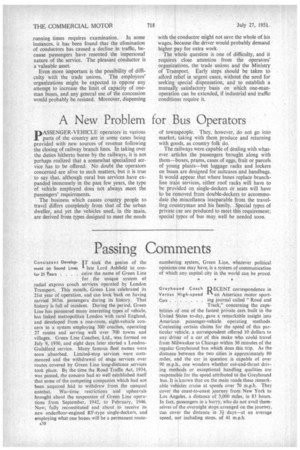A New Problem for Bus Operators
Page 32

If you've noticed an error in this article please click here to report it so we can fix it.
DASSENGER-VEHICLE operators in various parts of the country are in some cases being provided with new sources of revenue following the closing of railway branch lines. In taking over the duties hitherto borne by the railways, it is not perhaps realized that a somewhat specialized service has to be offered. No doubt the operators concerned are alive to such matters, but it is true to say that, although rural bus services have expanded immensely in the past few years, the type of vehicle employed does not always meet the passengers' requirements.
The business which causes country people to travel differs completely from that• of the urban dweller, and yet the vehicles used, in the main, are derived from types designed to meet the needs of townspeople. They, however, do not go into market, taking with them produce and returning with goods, as country folk do.
The railways were capable of dealing with whatever articles the passengers brought along with them—boxes, prams, cases of eggs, fruit or parcels of young plants—but luggage racks and lockers on buses are designed for suitcases and handbags_ It would appear that where buses replace branchline train services, either roof racks will have to be provided on single-deckers or seats will have to be removed from double-deckers to accommodate the miscellanea inseparable from the travelling countryman and his family. Special types of private car are produced to meet this requirement; special types of bus may well be needed soon.






























































































